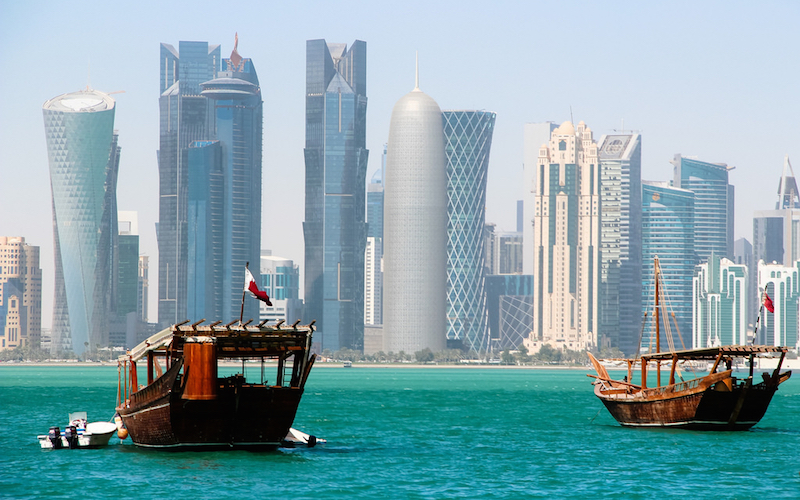
The Case for Qatar
Earlier this month, The New Republic published a controversial article written by two professors, Eric A. Posner and Glen Weyl from the University of Chicago. They argued that in solving global inequality, the U.S. and other OECD (Organisation for Economic Co-operation and Development) countries should be more like Qatar. If the West were to welcome poor migrants in proportion to their GDP at the same rate that Qatar does, and were to pay them, say, $5,000 per year, global inequality would fall by roughly a third. The reasoning is fairly simple and relies on the fact that migrants tend to send a great lump of their paychecks to their families, thereby bolstering domestic consumption, reducing poverty and accelerating the growth of poor countries. In their analysis, the migrants’ tradeoff between political rights and economic wealth is seen as beneficial for the whole.
Although this is a courageous argument to make, even when backed up by economic data, it points to the merits of going against the grain on controversial topics. Such exercises could yield surprising results that can reframe a particular debate and produce better policies. Indeed, the West cannot simply claim an intellectual monopoly on the “right” solutions, and countries placed on the geographical fringes of the Western political order could arguably hold worthwhile lessons. Adapting Western values within a difficult cultural and regional context points to the flexibility inherent in many of the ideas originating in the Anglo-Saxon world. And among these states, Qatar puts forward a convincing case that has persuaded this author to look beyond the scaremongering titles one can so easily find in Western media.
Maverick foreign policy
Sitting on some $17 trillion worth of natural gas (at today’s prices), Qatar has mobilized its considerable financial heft to punch way above the weight a population of 300,000 would usually afford. Stuck in the Arabian Peninsula and sharing its single land border with Saudi Arabia and at a stones’ throw away from the expansionistic Iranian Republic, the Middle Eastern monarchy has dabbled on the international stage across four continents. Whether through buying property in major cities, investing, brokering peace negotiations or sending humanitarian aid, Qatar’s footprint has become ubiquitous.
Qatar’s foreign policy has been shifted into overdrive following the 1990 invasion of Kuwait, when its leaders became acutely aware of the vulnerabilities brought by small-state anonymity. It therefore embraced a proactive agenda, aiming to establish itself as the go-to international mediator.
To this aim, it included Article 7 in its 2004 Constitution, which states that Qatar’s foreign policy is based on “encouraging peaceful resolution of international disputes [while] not interfering in the domestic affairs of other states.” The Gulf state’s preferred method has so far been to maintain a position of neutrality that allows it to engage with the widest possible number of partners to increase its influence, and by extension, its own security. The small gas giant has either reached out financially or intervened in almost every conflict of the past 15 years, from Afghanistan to Iraq, Libya, Ethiopia, Yemen, Israel, Lebanon or Sudan.
For many, its foreign agenda has lacked coherence and has oftentimes been accused of hypocrisy and double standards. For example, it hosted Israel’s trade office in Doha, while providing a safe heaven for the Hamas leadership or Islamists such as Sheikh Yusuf al-Qaradawi of the Muslim Brotherhood. Meanwhile, the Emir was conducting negotiations with Israeli leaders over Gaza’s status.
Such analysis tends to downplay the influence of Qatar’s two big neighbors, Saudi Arabia and Iran, both vying to claim leadership of the Muslim world. Doha’s track record has been to discreetly block and circumvent Iranian influence in the Middle East, while maintaining cordial diplomatic relations with Teheran. It’s worth noting that the two countries are forced to share the North Dome gas field, the largest in the world.
Its relationship with Saudi Arabia is even more complex – Qatar has been careful to play a game of give and take with Riyadh: supporting the Libyan revolution that toppled Gaddafi while backing up the Kingdom’s crackdown in Bahrain. This balancing act has not always succeeded; a major rift took place in March, when the Saudis, the Emirates and Bahrain recalled their ambassadors from Doha over Qatar’s support for the Muslim Brotherhood. The conflict was resolved in November, following an emergency meeting in Riyadh.
How to invest $100 billion
Qatar’s investment strategy also provides an interesting lesson for the policymakers. The country chose to direct its efforts across-the-board, using its deep purse to project policies and increase its soft power and international standing. The fundamental aspect of this investment strategy is its hard Reaganite realism, interested more in locking partners in mutually beneficial projects than in promoting a specific political agenda.
In London alone, the Qataris have invested more than $6.3 billion in real estate over the last three years. Qataris now own the iconic Harrods department store, the Shard, Western Europe’s tallest skyscraper and the Olympic Village. During the thick of the economic crisis, Qatar acted as a white knight investor, bailing out the troubled HSBC lender who refused to accept government money. In addition to HSBC, through its $100 billion sovereign fund, Qataris also own considerable stakes in Sainsbury’s, the company controlling Heathrow Airport and the London Stock Exchange.
Even if investments in the UK reached $47 billion this year, David Cameron, the British Prime Minister, recently appealed to the Qataris to plough more of their assets in the country’s infrastructure projects. Doha obliged, and has pledged to invest heavily in long-term multi-billion dollar projects, including a $78 billion high speed rail line from London to the country’s north, a super-sewer under the Thames, and renovating Birmingham’s city center. The same investment model has been emulated in the U.S., where Qatar has poured tens of billions in developing Washington D.C., buying Boeings or building LNG terminals in Texas. It also sought to gain the favor of the American public by donating $100 million in the wake of Hurricane Katrina.
Indeed, as Messrs. Posner and Weyl suggested, the U.S. should be more like Qatar. But the takeaways from the country’s actions are that taking amoral political decisions, operating within a hard realist framework, could greatly increase Washington’s standing in the world. Political posturing, an incessant desire to appease both idealist-liberal elements and hawkish-conservative elements present on the American scene, loses track of one of the main precepts of a realist foreign policy: viewing the world as it is rather than as we would like it to be.

